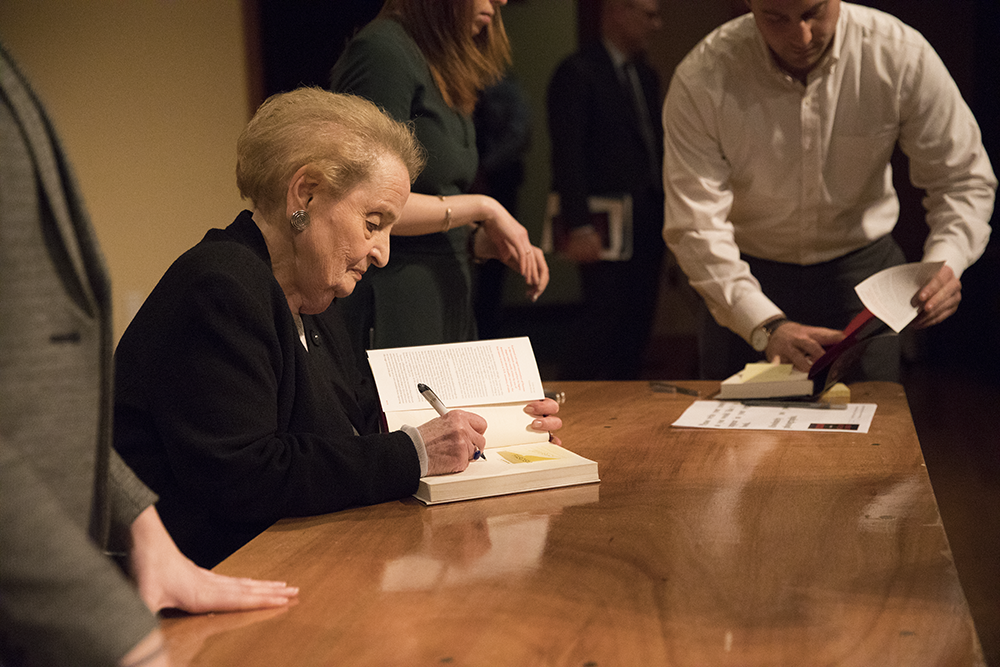Fascism is on the rise in the United States and could dismantle the nation’s democratic norms, former Secretary of State and Mortara Distinguished Professor of Diplomacy Madeleine Albright said at an event to discuss her new book, “Fascism: A Warning,” on Monday afternoon.
Albright said the books intends to warn readers about the dangers of modern fascism. Albright spoke with School of Foreign Service Dean Joel Hellman before taking questions from the crowd at Monday’s event, which took place in Lohrfink Auditorium.
Albright described a fascist society as one with a leader belonging to a hyper-nationalist “tribal party” who violates civil liberties and uses propaganda techniques to force their message onto the population.
“It’s not easy to define fascism, frankly,” Albright said. “It’s a way of organizing the government in a way to control everybody and really have an opportunity to deliver this message and aggregate power to himself and really undermine democratic institutions.”

Former Secretary of State Madeleine Albright signed copies of her new book, “Fascism: A Warning,” at an event Wednesday.
A fascist leader is a dictator who presents him or herself to the population as the solution to grievances, according to Albright. The difficulty in defining a fascist is the paradoxical nature of fascism, Albright said.
“A dictator might not become a fascist but a fascist is always a dictator,” Albright said.
Although she said she would not call President Donald Trump a fascist, Albright is concerned by his disrespect toward democratic institutions and belief he is above the law.
“I do think he is the most undemocratic president in history, because the issue here is that he has identified himself in a group and really wonders what the civil liberties are of the other,” said Albright. “There are a number of similar tendencies, but I would not call him a fascist.”
Albright described herself as a “centrist” who believes in compromise. The extreme right and the extreme left, she said, only serve to feed the growing division between the country’s “haves” and “have-nots.”
“The far right and far left is helping to divide the population and what we really should be doing is trying to find common interest and common ground and solve problems,” Albright said. “I believe in government but in order to make it work you do have to have problem solvers that understand common ground.”
When researching the growing fascist leaders around the world, Albright said, she was most surprised that most leaders were either elected or gained their power constitutionally. This revelation points to the grievances of the “have-not” populations across the globe who elect them, according to Albright.
As the title suggests, Albright’s book is a warning against fascism largely based on the historical context around the division between people who feel they are not being heard by their governments.
“I think we can learn from history and the fact that the people who want to become fascists are using the democratic institutions that they have and really manipulating them in a way that they are going to undermine democracy,” Albright said.
Shifting focus to U.S. international relations, Albright said the United States should continue to be involved internationally, as it makes the world safer.
“President Clinton was the first one to use the term ‘indispensable nation,’ but there is nothing about the term indispensable that means alone,” Albright said. “It just means we need to be engaged, so my sense is that America needs to be engaged with others.”
One of Albright’s biggest concerns in today’s America is complacency in responding to threats to democratic norms. Democracy is resilient but fragile, Albright said; she encouraged listeners to take steps to preserve democratic norms, even at the local level of government.
“I do worry that we are complacent, that’s the part that really worries me at the moment,” Albright said. “It took me a long time to find my voice — until I was at a high-level job when I was 55 — and now I’m not going to be quiet.”




















